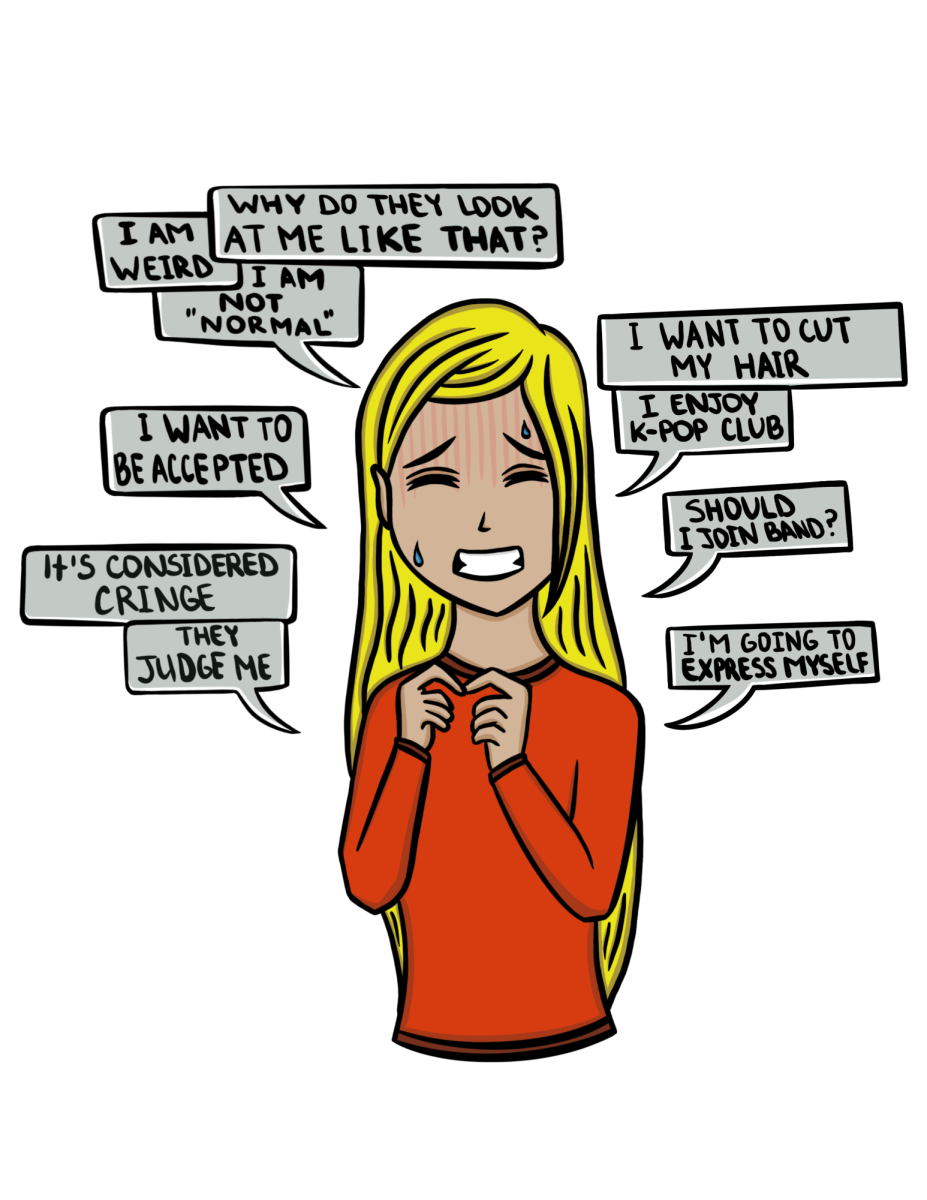Cringe culture refers to the awkwardness, embarrassment or the pressure to shame that often arises when someone or something is percieved as unusual. This is fueled by society’s tendency to judge others based on social norms, and it creates a social pressure that results in a common fear of judgment.
Junior Elaina Dumaliang (she/her) describes cringe culture as the way people attach a negative connotation to something they view as undesirable.
“When it comes to the idea of cringe, that’s how we denote that something is not really normal and sort of out of the norm in a negative way,” Dumaliang said.
As a member of Model United Nations and band, Dumaliang said some might perceive her as weird because she participates in those activities.
“It’s allowed me to become more outspoken, which means that I’ll say more things, and there’s a good chance that some of those things might be perceived as cringe,” Dumaliang said.
Because of this, Dumaliang said she still feels uncomfortable when peers watch or judge her.
“As much as you try and let go of it, it’s sort of still there,” Dumaling said. “That’s just human nature, that we want to be accepted by people, especially at this age and at this time.”
Also a member of band, sophomore Johanna Bote (she/her) said she has dealt with the stereotypes of band kids being perceived as weird, causing her to feel ashamed of her hobbies. However, she doesn’t let judgment stop her.
“Even if you do get hate for it, you have to stand up for yourself,” Bote said. “You can’t just let other people decide your perspective on things. If you’re gonna like something, you might as well like it with your whole heart.”
Senior El Larson (she/they) enjoys anime and cosplaying, and serves as president of K-pop club. She said that peers can be close-minded towards her interests.
“(Cringe culture) gives people a mindset of just this one side of a group of people, or certain things,” Larson said. “I think that everybody has their own likes and interests, and it’s not right of me to judge what people like.”
Closed mindsets can lead many to judge others’ interests. Dumaliang said a lack of understanding and interest causes judgment within society.
“I think a lot of social norms –– like often with cringe culture, it’s usually based on people who have very niche interests or very misunderstood interests, or things that people in general aren’t as interested in and so since people don’t understand it, they might be more quick to judge,” Dumaliang said.
Junior Bruna Bezerra (she/her) said that cringe culture looks different across generations and that social media causes these differences. She said that common sayings and popular videos on social media create trending jokes that people use. Similarily, Dumaliang said that social media has normalized the judgment of peers.
“I think social media has allowed people to express cringe or secondhand embarrassment towards things that people do,” Dumaliang said. “And it’s just made it more of a trend or more of a tradition to sort of judge people, and it’s made it almost more acceptable because more people can put their opinions on things.”
Bezerra said she waited two years to cut her hair short as she worried about how people would react. She said she also did not participate in many activities because she was scared of being perceived as weird.
“I didn’t really join any clubs or extracurriculars for the first semester of freshman year and everything before that,” Bezerra said. “I regret it a lot. I lost a bunch of experiences I could’ve had. It caused my freshman year to be a lot more boring.”
Bote believes that the fear of judgment has caused many to restrain themselves. Larson said that it’s important to know that no one is actually judging.
“Most people don’t really care all too much, and so you just kind of have to learn that it’s mostly in your head,” Larson said. “You should stand up for yourself, and in life, I think that you should always be confident in who you are as a person.”
Dumaliang said that being perceived as cringe can be uncomfortable but is ultimately temporary. She advises people to follow their passions.
“Regardless of how people perceive you, it won’t impact the talent you have or the abilities you have, and you just need to keep on working on it so you can be the best version of yourself,” Dumaliang said. “That is something that requires a bit of stepping out of your comfort zone –– and, of course, there’s risk in that, but the risk is 100% worth it.”











